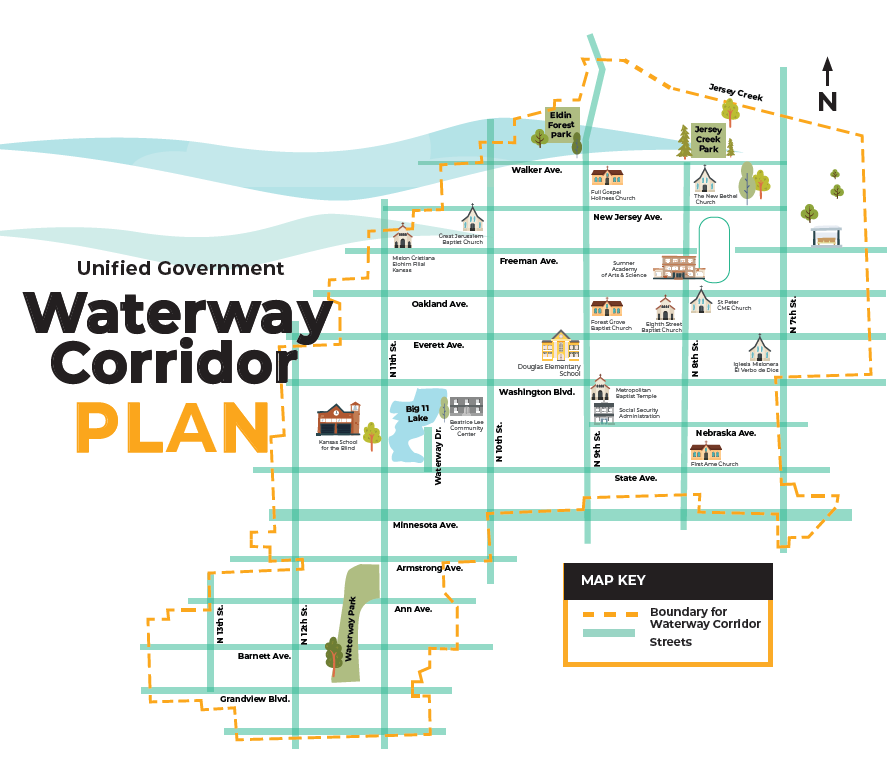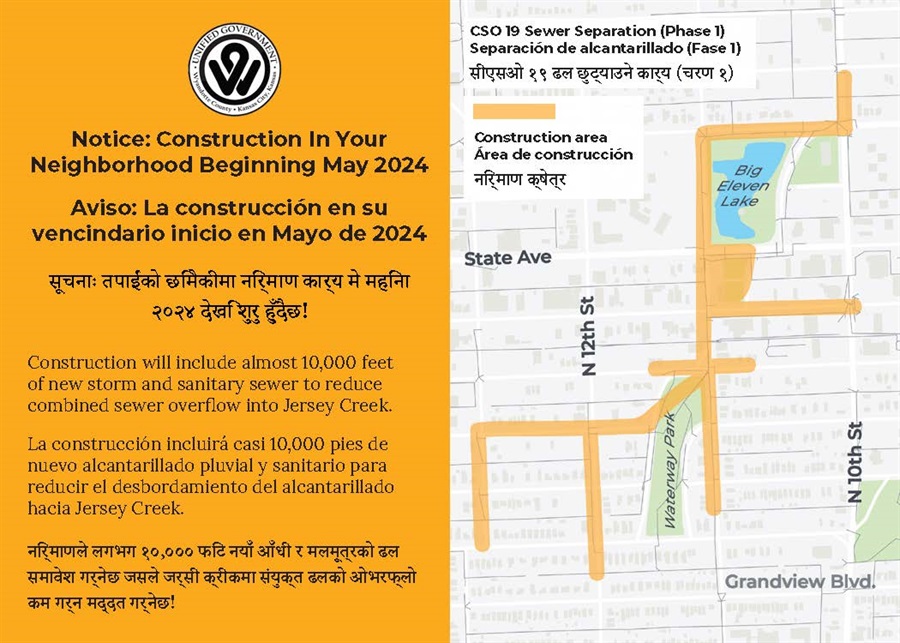
The Waterway Corridor Plan is a generational infrastructure investment that combines resources to maximize community benefits in tandem with storm and wastewater improvements. While there are federally required upgrades that need to be made to our water infrastructure, it also provides an opportunity to make community improvements such as sidewalks, green space, native plants, and more.
Waterway Corridor represents an underinvested area of Kansas City, Kansas (KCK). The community has spoken through previous plan documents about desired amenity and infrastructure improvements, and the Waterway Corridor Plan is the culmination of those recommendations. The Waterway Corridor Plan can be summarized as follows:
- It is the result of several previous community-led plans for the area, including the NE KCK Heritage Trail Plan, Douglass/Sumner Land Bank Strategy, Northeast Area Plan, goDotte Strategic Mobility Plan, Parks Master Plan, and PlanKCK.
- The purpose of the plan is to provide a community-driven vision which informs how future improvements (utilities, stormwater, streets, sidewalks etc.) are delivered in the area.
- The planning process focused on using the input and recommendations from the previous community-led plans as a guide to create the plan.
Read the Waterway Corridor Plan(PDF, 18MB)
Like so many other municipalities across the United States, the UG’s water and sewer system was not built for the current capacity. Older wastewater and stormwater pipes were originally combined. When it rains, stormwater mixes with wastewater and overwhelms the system, creating combined sewer overflow (CSO). When CSO spills into Jersey Creek before it can reach the treatment plant, it creates water pollution and public health concerns.
In addition to the CSO problem, there are also vacant lots, abandoned buildings, frequent flooding, and water quality issues. Because CSO events are bad for the environment, the Environmental Protection Agency (EPA) now requires municipalities to separate combined storm and wastewater systems.
While this is important for a healthy community, the UG doesn’t currently have funding to make the changes all at once. Therefore, the UG has entered into a Consent Decree agreement with the EPA to implement a strategic, phased approach to separate the storm and wastewater systems and develop stormwater management solutions over the next 25 years. This requires:
- Separating the combined sewer system
- Eliminating overflow into Jersey Creek
- New storm sewers to alleviate frequent flooding
Learn more about a Consent Deree here.


While this plan is the culmination of years of previous planning efforts, engagement for the Waterway Corridor Plan began in August 2023. Residents were invited to attend events or had the option to request a presentation. Events included:
- August 10, 2023 10am-2pm Open House at City Hall
- September 5, 2023 4pm-7pm Open House at Beatrice L. Lee Community Center
- October 28, 2023 9am-2pm Neighborhood Summit
- May 23, 2024 9am-10am Conversation with Livable Neighborhoods Task Force

2024 spring and summer engagement
Beginning May 2024, the Waterway Corridor Plan team will be engaging with residents of Northeast KCK. This includes going to monthly meetings of neighborhood groups.
If you would like to request a presentation at your meeting or event, please contact Long Range Planner Alyssa Marcy at amarcy@wycokck.org
Phase I of the CSO19 Sewer Separation Project will run from May 2024 to April 2025. While this project overlaps with the Waterway Corridor area discussed in this plan, Phase I only includes removal of the combined sewer/stormwater pipes and installation of two separate pipes. More information can be found here.
What are the proposed improvements this plan offers?
The Waterway Corridor Plan proposes the following types of improvements:

Will these projects impact our taxes?
Sewer separation work will not impact taxes. Phase I of CSO19 is funded through sewer user fees and Water Infrastructure and Finance Innovation Act (WIFIA), a federal low-interest loan program.
What are examples of green infrastructure successfully controlling stormwater and contamination?
According to KC Water, green infrastructure helps naturally manage stormwater by capturing and using stormwater where it falls, decreasing the amount of water that goes into pipes, and absorbing contaminants in water. Green infrastructure is used in many projects across the country and globe to improve communities in various ways:
Where will the construction occur?
Construction for Phase I of CSO19 begins May 2024 at the locations highlighted in the map below. For more information, please visit www.wycokck.org/CSO19

For up-to-date information on any ongoing or request road projects, you can check on the Capital Improvement Program map on the Public Works Engineering Page.
If Phase I of CSO19 only includes pipe replacement, when will the community see other benefits?
Improvements to the sewer system must be fully operational by December 31, 2027. Additional improvements to Waterway Corridor, such as park amenities, complete streets, and other development, will be funded separately and may have differing timelines.
When will the entire replacement of CSO19 be completed?
Phase 1 is scheduled to be completed in Spring 2025. Phase 2 is required to be completed by the end of 2027. Any additional phases will require analysis for phasing and budget consideration to be adopted by the Board of Commissioners.